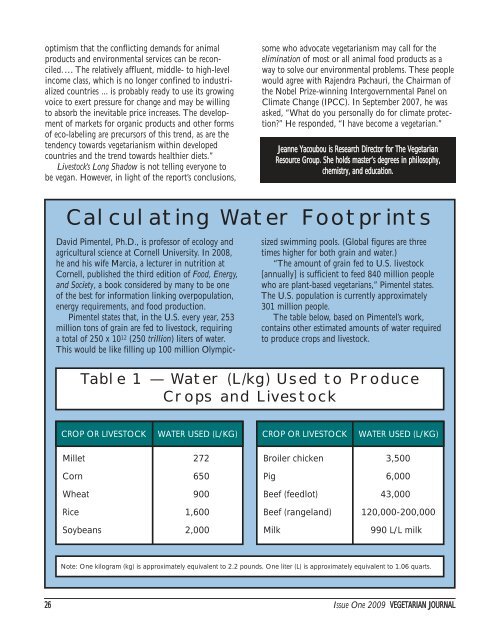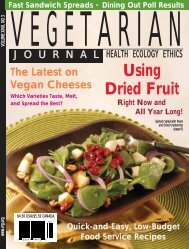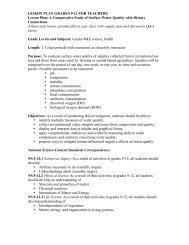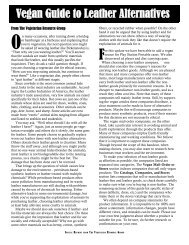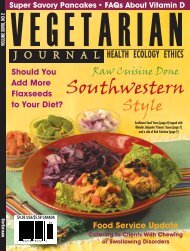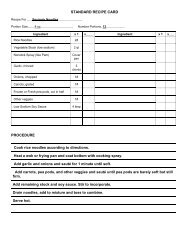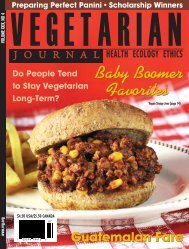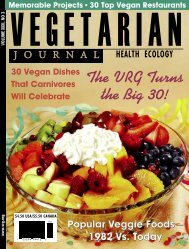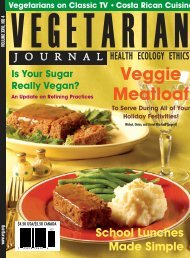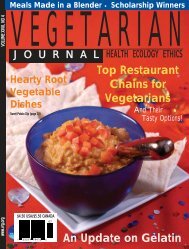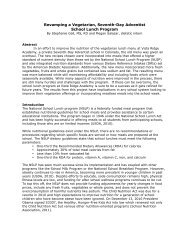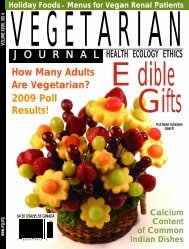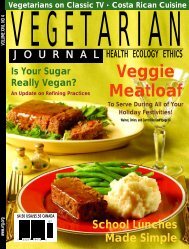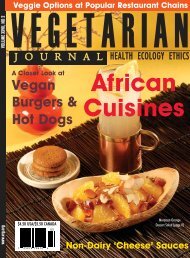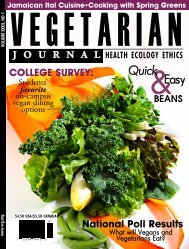Weekend Brunch Ideas - The Vegetarian Resource Group
Weekend Brunch Ideas - The Vegetarian Resource Group
Weekend Brunch Ideas - The Vegetarian Resource Group
You also want an ePaper? Increase the reach of your titles
YUMPU automatically turns print PDFs into web optimized ePapers that Google loves.
optimism that the conflicting demands for animalproducts and environmental services can be reconciled.…<strong>The</strong> relatively affluent, middle- to high-levelincome class, which is no longer confined to industrializedcountries ... is probably ready to use its growingvoice to exert pressure for change and may be willingto absorb the inevitable price increases. <strong>The</strong> developmentof markets for organic products and other formsof eco-labeling are precursors of this trend, as are thetendency towards vegetarianism within developedcountries and the trend towards healthier diets.”Livestock’s Long Shadow is not telling everyone tobe vegan. However, in light of the report’s conclusions,some who advocate vegetarianism may call for theelimination of most or all animal food products as away to solve our environmental problems. <strong>The</strong>se peoplewould agree with Rajendra Pachauri, the Chairman ofthe Nobel Prize-winning Intergovernmental Panel onClimate Change (IPCC). In September 2007, he wasasked, “What do you personally do for climate protection?”He responded, “I have become a vegetarian.”Jeanne Yacoubou is Research Director for <strong>The</strong> <strong>Vegetarian</strong><strong>Resource</strong> <strong>Group</strong>. She holds master’s degrees in philosophy,chemistry, and education.Calculating Water FootprintsDavid Pimentel, Ph.D., is professor of ecology andagricultural science at Cornell University. In 2008,he and his wife Marcia, a lecturer in nutrition atCornell, published the third edition of Food, Energy,and Society, a book considered by many to be oneof the best for information linking overpopulation,energy requirements, and food production.Pimentel states that, in the U.S. every year, 253million tons of grain are fed to livestock, requiringa total of 250 x 10 12 (250 trillion) liters of water.This would be like filling up 100 million Olympicsizedswimming pools. (Global figures are threetimes higher for both grain and water.)“<strong>The</strong> amount of grain fed to U.S. livestock[annually] is sufficient to feed 840 million peoplewho are plant-based vegetarians,” Pimentel states.<strong>The</strong> U.S. population is currently approximately301 million people.<strong>The</strong> table below, based on Pimentel’s work,contains other estimated amounts of water requiredto produce crops and livestock.Table 1 — Water (L/kg) Used to ProduceCrops and LivestockCROP OR LIVESTOCK WATER USED (L/KG) CROP OR LIVESTOCK WATER USED (L/KG)Millet 272Corn 650Wheat 900Rice 1,600Broiler chicken 3,500Pig 6,000Beef (feedlot) 43,000Beef (rangeland) 120,000-200,000Soybeans 2,000Milk990 L/L milkNote: One kilogram (kg) is approximately equivalent to 2.2 pounds. One liter (L) is approximately equivalent to 1.06 quarts.26 Issue One 2009 VEGETARIAN JOURNAL


